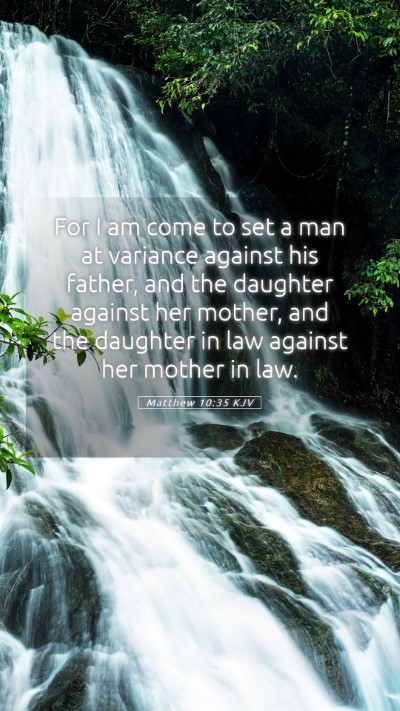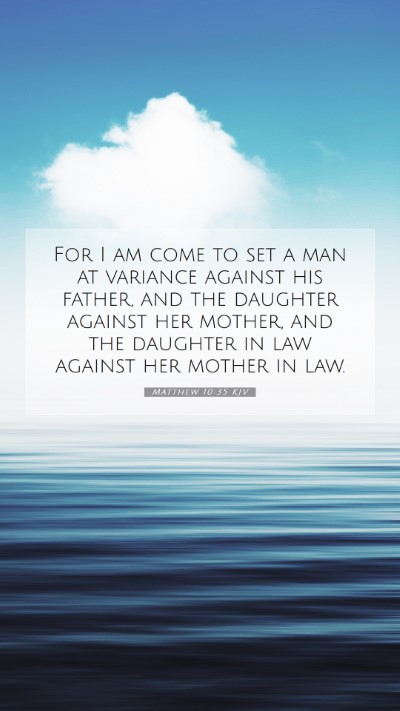Bible Verse Interpretation: Matthew 10:35
Bible Verse: Matthew 10:35 - "For I have come to set a man against his father, and a daughter against her mother, and a daughter-in-law against her mother-in-law."
This verse speaks to the sometimes divisive nature of Jesus' message and mission. To gain a deeper understanding of the teachings found in Matthew 10:35, we will explore several public domain commentaries, including those by Matthew Henry, Albert Barnes, and Adam Clarke.
Summary of Insights from Commentaries
Matthew Henry's Commentary
Contextual Understanding: Matthew Henry emphasizes that this passage reflects the often painful divisions that can arise within families due to the Gospel. Jesus acknowledges that his teachings will lead to conflict, even among loved ones, as individuals choose their faith over familial ties.
Spiritual Priorities: The commentary underlines that following Christ may require prioritizing spiritual commitments over earthly relationships. Jesus calls for loyalty to Him above all else, illustrating that faith can disrupt the status quo, compelling believers to make difficult choices.
Albert Barnes' Commentary
Purpose of Division: Albert Barnes interprets this statement as a foreshadowing of the challenges faced by the early Christians, who often encountered opposition not only from the outside world but also from within their own households. He points out how this division was not merely a prediction, but a reality that followers of Christ had to navigate.
Understanding Conflict: Barnes adds that the nature of this conflict is deeply spiritual. It is a conflict that arises when one's heart is set on following Jesus amidst a world that may not approve of or understand that choice.
Adam Clarke's Commentary
Historical Context: Adam Clarke discusses the historical implications of Jesus’ words, noting how they reflect the societal norms of the time, where family loyalty was paramount. He elucidates that Jesus’ intention was not to destroy familial relationships, but to elevate the commitment to God above any earthly ties.
Application to Today's Believers: Clarke concludes his interpretation by suggesting that modern-day believers may also face similar trials. These challenges serve as a reminder of the call to stand firm in faith, even when it leads to discord within personal relationships.
Theological Implications
Matthew 10:35 challenges believers to reflect on the depth of their commitment to Christ. It serves as a sobering reminder that true discipleship can often lead to conflict and division:
- Faith tested by relationship discord.
- The necessity of prioritizing allegiance to Christ over familial expectations.
- Understanding the cost of discipleship in contemporary contexts.
Cross References
Several other Bible verses relate closely to Matthew 10:35, deepening our understanding of its context and meaning:
- Luke 14:26: "If anyone comes to me and does not hate his own father and mother and wife and children and brothers and sisters, yes, and even his own life, he cannot be my disciple."
- Matthew 10:34: "Do not think that I have come to bring peace to the earth. I have not come to bring peace, but a sword."
- Micah 7:6: "For the son treats the father with contempt, the daughter rises up against her mother, the daughter-in-law against her mother-in-law; a man's enemies are the men of his own household."
Conclusion
Matthew 10:35 encapsulates a critical lesson in the Christian faith regarding the potential for division arising from one's commitment to Jesus. Through a careful exegesis of this verse, believers gain vital insights into the nature of discipleship, the call to prioritize faith, and the reality of spiritual conflict.
For those seeking a deeper understanding of Bible verses, engaging with commentary and analysis can provide valuable perspectives on Scriptures' meanings, aiding in personal Bible study and group discussions alike.


